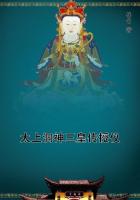In solemn procession, followed by all the cardinals and high church officials, surrounded by the Swiss guards, the tolling of the bells and the dull rolling of the muffled drums, the solemn hymns of the priests, moved the funeral /cortege/ from the Vatican to St. Peter's church. In the usual open coffin lay the corpse of the deceased pope, that the people might see him for the last time. As they passed the bridge of St. Angelo, when the coffin had reached the middle of the bridge, arose a shriek of terror from thousands of throats! A leg had become severed from the body and hung out of the coffin, swinging in a fold of the winding-sheet. Cardinal Albani, who walked near the coffin, was touched on the shoulder by the loosely swinging limb, and turned pale, but he yet had the courage to push it back into the coffin. The people loudly murmured, and shudderingly whispered to each other: "The dead man has touched his murderer. They have poisoned him, our good pope! His members fall apart. That is the effect of /Acqua Tofana/."
Archenholz relates yet another case where the Acqua Tofana had a similar violent and sudden effect. "A respectable Roman lady, who was young and beautiful, and had many admirers, made in the year 1778, a similar experiment, to rid herself of an old husband. As the dose was rather strong, death was followed by the rapid and violent separation of the members. They employed all possible means to retain the body in a human form until the funeral was over. The face was covered with a waxen mask, and by this means was the condition of the corpse concealed. This separation of the members seems to be the usual effect of this poison, and is said to occur as soon as the body is cold."The infernal work had therefore proved successful, the vengeance was complete--Ganganelli was no more, and upon the papal throne sat Braschi, the friend of the Jesuits and of Cardinal Albani, to whom he had promised the crowning of the improvisatrice Corilla.
And as this cost nothing to the miserly Pope Pius, he this time found no inconvenience in keeping his sacred promise, though not so promptly as Corilla and the passionate cardinal desired.
Not until 1776, almost two years after Braschi had mounted the papal throne, took place the crowning of the improvisatrice in the capitol at Rome.
She had therefore attained the object of her wishes. She had finally reached it by bribery and intrigue, by hypocritical tenderness, by the resignation of her maiden modesty and womanly honor, and by all the arts of coquetry.
But this triumph of hers was not to be untroubled. The /nobili/shouted for her, and the cardinals and princes of the Church, but the people accompanied her to the capitol with hissing and howling. Poems came fluttering down on all sides; the first that fell upon Corilla's head, Cardinal Albani eagerly seized and unfolded for the purpose of reading it aloud. But after the first few lines his voice was silenced --it was an abusive poem, full of mockery and scorn.
But nevertheless she was crowned. She still stood upon the capitol, with the laurel-crown upon her brow, cheered by her respectable protectors and friends. But the people joined not in those cheers, and, as the exulting shouts ceased, there swelled up to the laurel-crowned poetess, from thousands of voices, a thundering laugh of scorn, and this scornful laugh, this hissing and howling of the people, accompanied her upon her return from the capitol, following her through the streets to her own door. The people had judged her!
Corilla was no poetess by the grace of God, and only by the grace of man had she been crowned as queen of poesy!
Mortified, crushed, and enraged, she fled from Rome to Florence. She knew how to flatter the great and win princes. She was a princess-poetess, and the people rejected her!
But the laurel was hers. She was sought and esteemed, the princes admired her, and Catharine of Russia fulfilled the promise Orloff had made the improvisatrice in the name of the empress. Corilla received a pension from Russia. Russia has always promptly and liberally paid those who have sold themselves and rendered services to her. Russia is very rich, and can always send so many thousands of her best and noblest to work in the mines of Siberia, that she can never lack means for paying her spies and agents.















